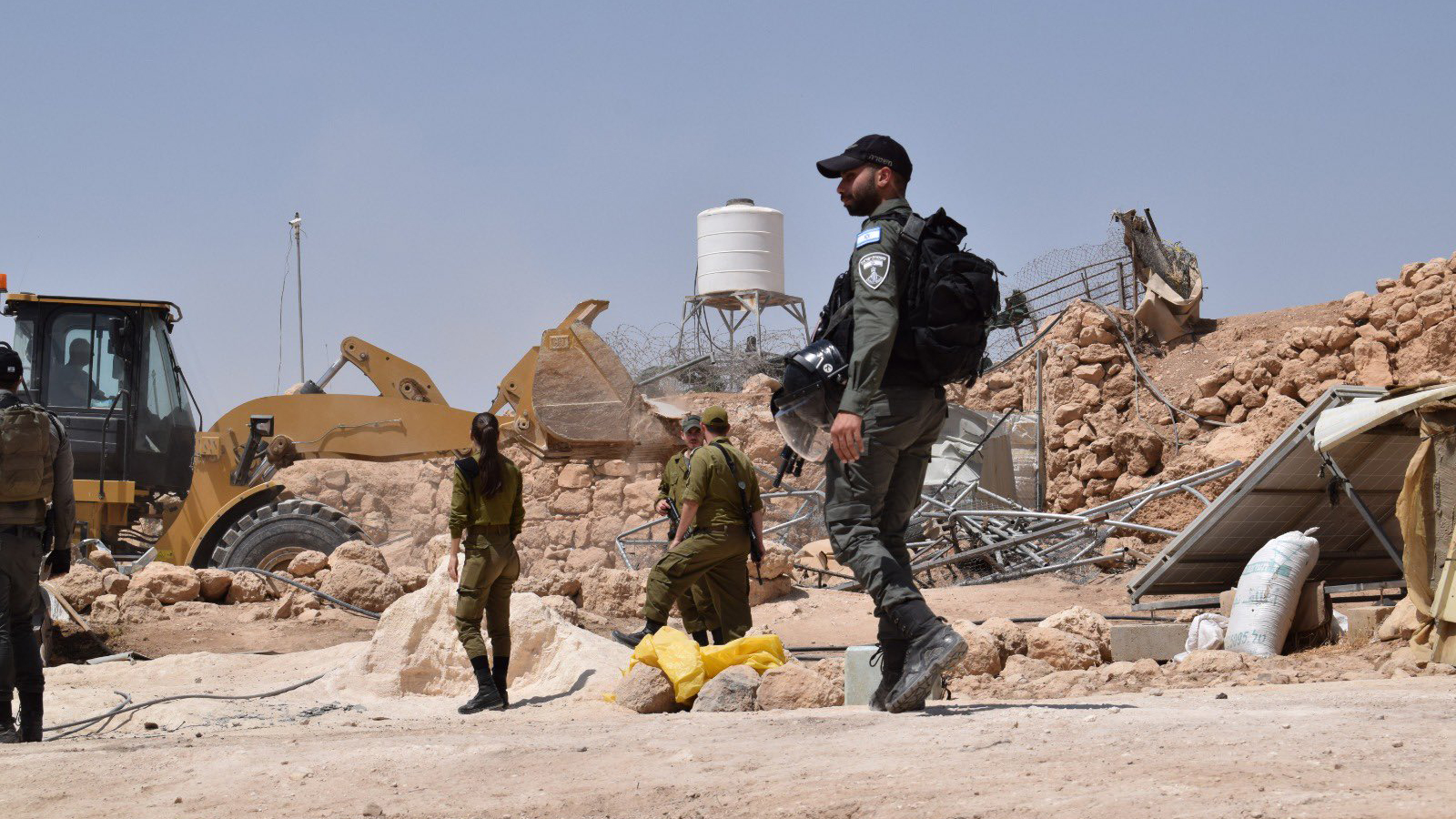Following the Israeli Supreme Court’s May 4th decision on the Abu Aram v. Minister of Defense case, which allows the Israeli military to displace over 1000 Palestinians from the Masafer Yatta region for the establishment of a military firing zone, Palestinian villagers have been bracing themselves for Israel’s ongoing forced expulsions. Demolitions are already underway.
Although Israel was demolishing Palestinian homes before the court order, just a week after the decision, the Israeli Civil Administration (CA) demolished 19 structures. Amongst these structures were homes and livestock sheds in two villages in Masafer Yatta: Khirbet al-Fakhit and al-Markaz.
On June 1, Israeli human rights organization B’Tselem documented the destruction of the homes of four families in the aforementioned villages. These were homes that had been rebuilt after the May 11 demolitions. Basel Adra, an activist and resident of Masafer Yatta shared a video of the CA bulldozing tents to the ground, adding that 21 people lost their homes on June 1. In the video, Israeli soldiers announce, “This is firing zone 918, you don’t live here,” as villagers denounce the brutality. Referring to the homes demolished in May, Adra tweeted that the woman crying in the video had been sleeping in a tent with her children after her home was destroyed last month. “Today,” he added, “they came back, specially [sic] to destroy her tent.”
More destruction is expected in the coming days and weeks. On June 7, Adra shared that an Israeli soldier in the village of Taban, Masafer Yatta, gave the villagers demolition orders of “all they have: homes, water wells, roads – to be destroyed probably this week.” A week later, on June 13, the anti-occupation resistance group Youth of Sumud shared a photo of the final demolition orders of their center, after the CA and military entered the village of Tuwani.
In addition to the explicitly state-sanctioned expulsions enacted through the demolition of homes, residents of Masafer Yatta also face violence from illegal Israeli settlers, a frequent occurrence in the occupied West Bank. On June 11th, Wafa, the Palestinian National Authority’s official news agency, reported that settlers near Shaab al-Batam attacked and injured shepherd Hamza Ahmad Najjar as he was herding his sheep.
This most recent Israeli attack against Palestinians in Masafer Yatta has been met with criticism from the international community. In a statement following the Supreme Court’s decision, the European Union announced that it “condemns such possible plans and urges Israel to cease demolitions and eviction.” Likewise, United Nations human rights experts suggested that the “displacement of the Masafer Yatta communities [may] amount to a war crime.”
The Masafer Yatta court ruling came after decades of legal controversy, where Palestinian petitioners, who have been living in the region for generations, sought to prove their right to permanent residence in the villages of Masafer Yatta, located in Area C of the West Bank, which is under Israeli military control. In 1980, the Israeli military declared the region to be a “closed military firing zone” termed “firing zone 918.” State archives reveal that this move was part of a larger strategy to dispossess Palestinian villagers. Israeli authorities have asserted that Palestinians in Masafer Yatta are seasonal inhabitants, denying their permanence, and claiming that they lack the proper legal permits to build structures on the land. It should be noted that in the Israeli military-controlled Area C, it is practically impossible for Palestinians to obtain permits for building homes. While Israel’s actions in the occupied West Bank, which involve the forced transfer of populations, violate the Fourth Geneva convention, the court ruling maintains that this piece of international law is not customary, meaning that it is not legally bound by the convention.
Despite condemnations from international bodies, the destruction in Masafer Yatta is enabled by the support and active participation of global corporations whose machinery provides the means for the demolition of Palestinian homes. According to Ramallah-based grassroots organization Stop the Wall, Youth of Sumud, the activist group whose center is slated for upcoming demolition, documented the use of JCB, Volvo, and Caterpillar equipment in the demolition of structures in the Masafer Yatta. Based on the report, these Europe and US-based companies have also been involved in previous cases of home demolition in occupied Palestine.
While the Israeli demolition campaign in Masafer Yatta stands out because of its scale—projected to displace 1,200 Palestinians amongst whom 500 are children—the events fall in line with a larger campaign by the Israeli state to realize the de facto annexation of the West Bank via the ethnic cleansing of Palestinians. This is part of what many Palestinian activists term the “ongoing Nakba,” Nakba as a term referring to the forced displacement of over 750,000 Palestinians during the the formation of the Israeli state in 1948.





